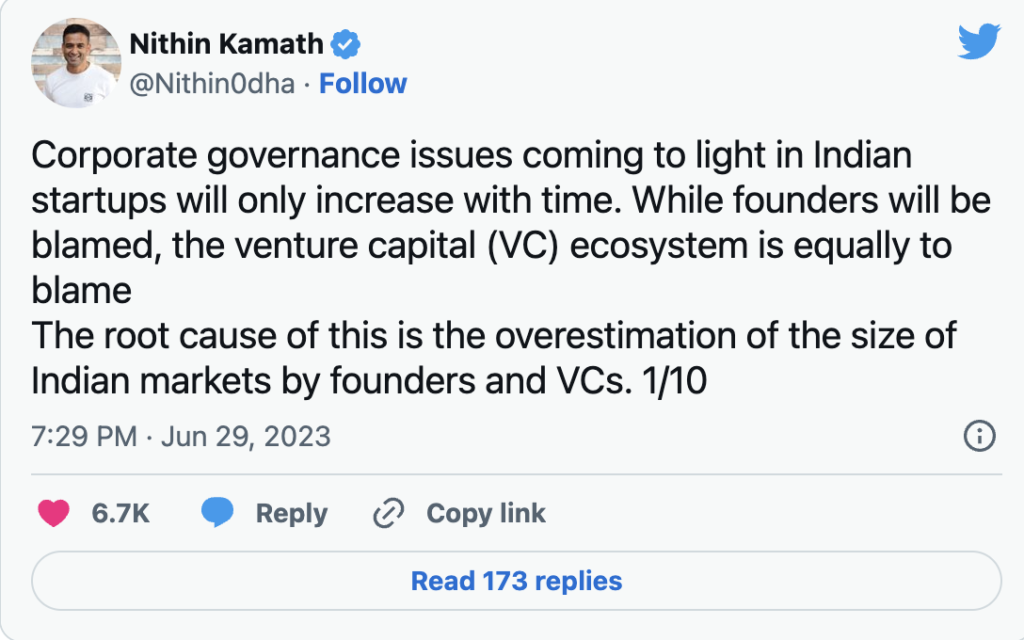
June 30, 2023 – Nithin Kamath, the Founder and CEO of Zerodha, has expressed his concerns about the increasing corporate governance issues within Indian startups. In a series of tweets, Kamath emphasized that both founders and venture capitalists (VCs) share the responsibility for these challenges.
While acknowledging that founders often bear the brunt of the blame, Kamath asserted, “The venture capital (VC) ecosystem is equally to blame. The root cause of this is the overestimation of the size of Indian markets by founders and VCs.” Kamath believes that this overestimation will contribute to the deterioration of corporate governance issues over time.
In his tweets, Kamath highlighted the disparity between India’s current economic status and its potential as a future economic superpower. He stated, “While India is a fast-growing economy that will hopefully be an economic superpower in the future, it isn’t that today. The size of the target market (TAM) by revenue needs to increase significantly to justify the valuations of the startup ecosystem in the country.”
Kamath further explained that many VCs have made erroneous calculations and may have exaggerated the opportunities in India to their limited partners (LPs). He argued that achieving substantial exits within the typical seven-year fund lifecycle, during which founders are expected to produce exits, is challenging in a “small market like ours” with limited mergers and acquisitions (M&A) opportunities.
The Zerodha CEO stressed that building a successful business in India requires time and cited a scarcity of examples where such feats have been accomplished in less than ten years. He questioned the feasibility of building a sustainable business when VC funds have short lifecycles and exert pressure on startups for early exits. Kamath suggested that extending India’s fund lifecycles might be a solution worth considering.
According to Kamath, founders are compelled to craft narratives that align with what the VC industry is selling to their limited partners (LPs) in order to secure funding. He expressed concerns about the prevalence of unrealistic projections in startup pitch decks, stating, “I’ve seen so many startups get funding whose pitch decks were practically delusional. VCs should help correct this in an ideal world, not fuel the delusion.”
Kamath highlighted a specific example where startups claimed that 30-50 crore (300-500 million) Indians would be investing by 2027, with the expectation of capturing over 10% of that market. He found this projection unfounded, particularly considering that only around 6 crore (60 million) Indians were filing income tax returns at the time. Kamath raised the question of why such claims were not scrutinized more rigorously before funding was provided.
Summarizing the root cause of the issue, Kamath stated, “Believing in a TAM (total addressable market) that isn’t there yet and then burning out by chasing it.” He predicted that most future governance issues would not stem from typical fraud but rather the falsification of information to support founders’ exaggerated narratives for capital raising. Kamath argued that the VC ecosystem, driven by incentives to consistently oversell, should also be held accountable alongside founders.
Kamath asserted that India requires a steady and continuous flow of capital, as opposed to sporadic bursts, to achieve its potential as an economic superpower. He cautioned that building or investing in businesses with unrealistic expectations can lead to false narratives and hinder the smooth flow of capital, thereby reducing the likelihood of India reaching its economic aspirations.

Read more :
Evolved Foods Raises INR 7.30 Crore in Funding, Pioneering the Plant Protein Revolution
To get more updates, Follow us on Facebook, Twitter, Instagram and LinkedIn
Last Updated on Saturday, July 1, 2023 12:09 pm by Pavaneshwar
